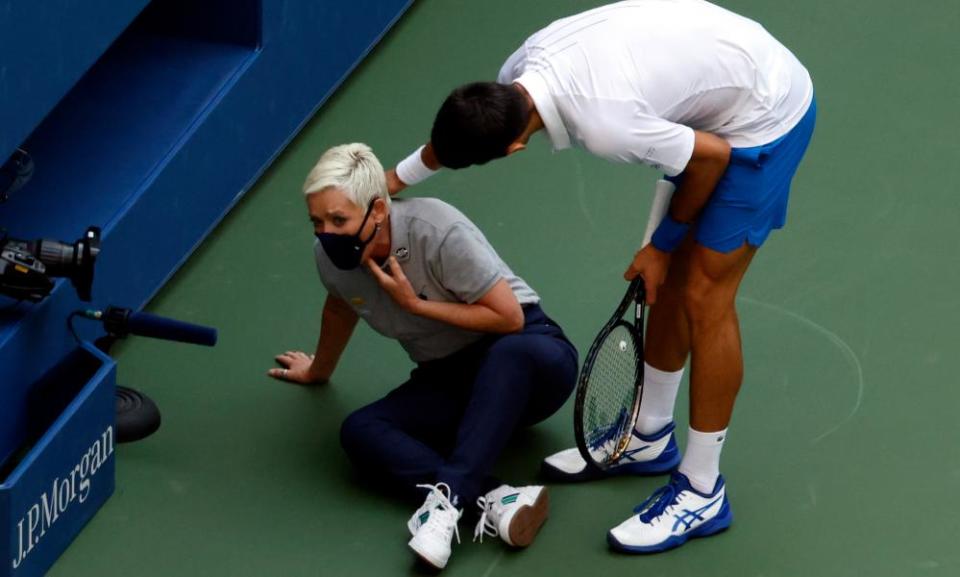It turns out the only man who can beat Djokovic this season is himself

A US Open bound to be remembered for oddities like empty stadiums, social distancing and bubbles within bubbles took its strangest detour yet on a sweltering Sunday afternoon in Queens when Novak Djokovic, the best player in the world and top seed in the men’s draw, was defaulted from his fourth-round match with Spain’s Pablo Carreño Busta after accidentally hitting a line judge in the throat with a ball struck in a moment of ill temper.
The shock expulsion was, as the USTA’s statement quickly clarified, the correct decision regardless of Djokovic’s intent, and one that has further rocked a tournament already compromised by absent holders and watered-down fields. We may be through with 2020, but 2020 ain’t through with us.
Related: 'So unintended. So wrong': Novak Djokovic apologises after US Open disqualification
The world No 1 quietly absconded from the grounds without doing press – though he later apologised – with his bid for an 18th major title in tatters along with his perfect record in 26 matches to start the season. Turns out the only man who could beat Djokovic this year was Djokovic himself.
Novak Djokovic has been defaulted from 2020 US Open.
Lesson:
-Staying calm is highly important even if you are already at the top
-Never led your disappointment turn into Anger
-Just a second of reaction has power to change your life for good or bad
Courtesy: SM pic.twitter.com/IQ9WWYasRZ— Awanish Sharan (@AwanishSharan) September 7, 2020
If there was a silver lining for the organizers, it was perhaps that Sunday’s abrupt final act played out in an Arthur Ashe Stadium dotted with a few dozen players and officials and not 23,000 well-lubricated spectators denied a feature-length attraction after shelling out for the Labor Day weekend tickets that regularly fetch hundreds above face value on the secondary market. One can only imagine a scene fueled by the longrunning antipathy between Djokovic and the New York crowd, a beef that goes back more than a decade to a time when he was fighting a reputation as a drama queen who melted under pressure and operated with a shall we say liberal approach to the medical timeout rule.
Back in 2008, Djokovic didn’t take it kindly when Andy Roddick sardonically rattled off a laundry list of maladies during a press conference ahead of their third-round matchup, suggesting “bird flu”, “anthrax” and “Sars” as potential future excuses to be made by the Serb. After humbling the top-ranked American in a match where his service faults and errors were met with cheers, Djokovic provoked the crowd during an on-court interview until a smattering of boos grew into a cacophony. The frosty relations have never quite thawed, even after he won the tournament in 2011, 2015 and 2018.
So there is little doubt the US Open averted what may have been an ugly spectacle. But what it means for Djokovic moving forward, at least beyond his devoted fanbase, is less certain.
For one, this is not the first time Djokovic’s pattern of reckless behavior on the court has been put to question. In the 2016 French Open quarter-finals, he admitted he was “lucky” not to hit a nearby line judge when his racket flew out of his hand as he went to smash it in the dirt. Then a few months later at the ATP finals in London, Djokovic snapped at a reporter who suggested he nearly hit a spectator when he whizzed a ball in the direction of his players’ box.
“You guys are unbelievable,” he said at the time. “Because you’re always picking these kind of things. I’m the only player that shows his frustration on the court? That’s what you are saying? It’s not an issue for me. It’s not the first time I did it.
“It could have been [serious], yes. It could have snowed in the O2 Arena as well, but it didn’t.”
But Sunday’s default also comes at the end of summer where Djokovic’s reputation has taken a battering, between amplifying anti-vaxxing conspiracies while turning over his global platform to various snake oil salesmen – to say nothing of his disastrous Adria Tour experiment in June, which to many came off as flat coronavirus denial at the height of the worldwide outbreak. An extended exercise in damage control has followed in the months since, the fingerprints of which were evident in his deeply contrite statement issued later on Sunday night.
Not only does the Serb’s departure ensure a first-time grand slam champion in the men’s tournament at Flushing Meadows, it will mark the first major tournament without Djokovic, Federer or Nadal in the last four since the 2004 French Open. All it took was a global pandemic and Sunday’s freak denouement.
Djokovic remains to many an outsider: the third man who disrupted the beloved Federer-Nadal duopoly, existing unapologetically outside the sport’s American/western European establishment. Not since Ivan Lendl has an all-time great appeared to be so unloved beyond his core supporters.
Through ruthless dominance Djokovic has become his sport’s Floyd Mayweather sans the rap sheet: a champion leagues above his rivals who rules with a technical brilliance that critics degrade as mechanical and boring. And like Mayweather, he’s shown he’s clearly willing to embrace the villain’s role when it’s thrust upon him and has demonstrated time and again the ability to feed off negative energy.
But episodes like Sunday’s, however unlucky, do beg a certain Balotellian question when it comes to Djokovic. Why always him? That it has no easy answer, after all this time, makes it no less worthy of inspection.

 Yahoo Sport
Yahoo Sport 





































